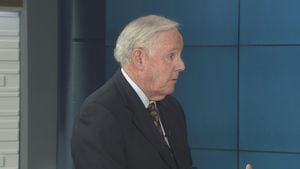Political tensions are reaching new heights within Karnataka as the "Kaala" remark controversy engulfs state leaders, flagging racial sensitivities and igniting fierce backlash. This clash began when Karnataka's Minister for Tourism and Waqf, Zameer Ahmad Khan, made the controversial comment about Union Minister HD Kumaraswamy, referring to him as "Kaala Kumaraswamy." This remark has been widely denounced as derogatory and racially charged, prompting sharp reactions from various political figures.
Union Minister Kumaraswamy, known for his calm demeanor, broke his silence at Mysuru's Chamundeshwari temple, expressing his displeasure over the slur. He responded to the remark with indignation, stating, "Do you think I come from such a background to address Minister Zameer as 'shorty' and to be called as 'kariya' (Kaala, blacky) by him? His words show his culture." This statement showcases Kumaraswamy's attempt to highlight the gravity of the comment, insisting on respect and decorum within political discourse.
Continuing his address, Kumaraswamy criticized Congress leaders, including Karnataka's Chief Minister Siddaramaiah and Deputy Chief Minister DK Shivakumar, who seemed to downplay the severity of the remarks. Kumaraswamy pointed out the defense mounted by these leaders, questioning their lack of shame: "Don't they find it objectionable and disgusting? Do they have no shame left in them?" His statements reflected not just personal affront but also the broader impact of such remarks on societal relations.
Echoing Kumaraswamy’s sentiments, various other leaders from different parties criticized the initial comment. This situation has evolved beyond personal differences, morphing it to reveal deep-seated issues of race and identity within Indian politics. With ethnic and regional tensions often flaring, leaders and party members alike are urged to tread carefully on the linguistic ground.
Political analysts argue this incident could have repercussions on the prevailing political climate leading up to upcoming elections. The fallout from the controversy could influence voter sentiment, particularly among marginalized communities who may feel targeted by such remarks. Kumaraswamy's comments resonate with many who demand accountability from those in power.
The backdrop of this controversy paints Karnataka's political climate as increasingly polarized. The region has seen movements advocating for various rights and representation, making racial remarks even more sensitive. Despite Zameer Ahmad Khan later apologizing—stressing he and Kumaraswamy were friends and had used terms like "kulla" (shorty) ironically—many remain unconvinced. His apology failed to mitigate the damage done and served to inflame emotions rather than resolve the matter.
Public responses to the incident have been vociferous, with many taking to social media to voice their disapproval. Politicians and activists are calling for stricter measures against racially charged comments, seeking to establish new protocols for decorum and respect within political spheres.
Reflecting on the broader implications of the "Kaala" remark, Karnataka Pradesh Congress Committee has faced considerable backlash for its perceived leniency toward racial remarks, prompting discussions about accountability and ethical governance. Should these opinions filter down to the electorate, the ramifications could be significant as they question which party values civil discourse and which does not.
The controversy has placed Kumaraswamy and Zameer but also the Congress party under scrutiny, heightening the stakes leading up to the bye elections. With public sentiment swaying and perceptions being shaped, it remains to be seen how these dynamics affect voting patterns.
While racial slurs are not new to the political arena, the growing intolerance for such language reflects shifting boundaries within societal consciousness. Demonstrative of larger cultural narratives around identity and representation, the "Kaala" remark sheds light on the necessity for political figures to lead with sensitivity and awareness.
Despite the current tensions, Karnataka's political history is also one of resilience and unity, showcasing how leaders can rise above contentious remarks if they actively promote mutual respect and dialogue. The challenge lies not only within party lines but with a collective commitment to constructive politics.
With the tensions surrounding the "Kaala" remark still palpable, how the involved individuals navigate this controversy could very likely shape future political landscapes within Karnataka, urging all involved to recalibrate their approach to dips and divides within the fabric of society.



